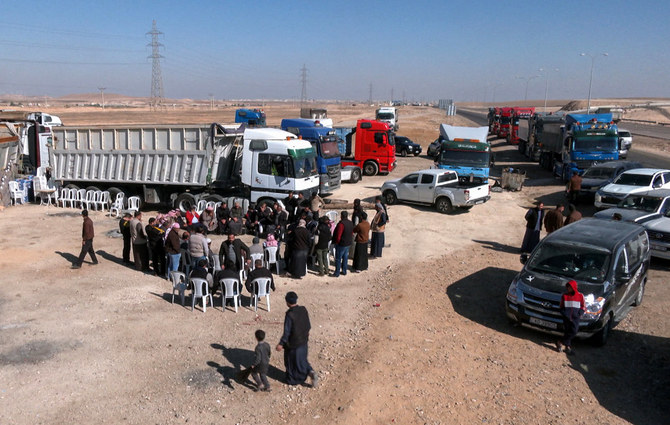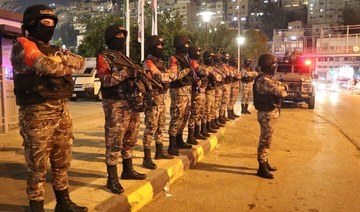MAAN, Jordan: Striking Jordanian trucker Suleiman Abu Al-Zait spent several long nights on a national highway along his native city of Maan, manning a picket line that created havoc to overland trade.
“Diesel is my lifeline,” said 54-year-old Abu Al-Zait, who has seen his livelihood thrown into jeopardy by high fuel price rises since Russia invaded Ukraine.
The month-long sit-in cost Jordan tens of millions of dollars in losses when it paralyzed unloading at the Red Sea port of Aqaba, according to officials and industrialists.
The stoppage petered out late last year, after a security clampdown to stop disgruntled Bedouin youths from desert hamlets near Maan throwing stones at tourist coaches and trailers.
The crackdown led to four deaths among security forces and one man whom authorities said was a militant fugitive, as well as scores of injuries and hundreds of arrests.
It was the latest bout of unrest in Maan, a poor tribal stronghold about 250 km (156 miles) south of the capital.
Its location between Aqaba and a main pilgrimage route along the old Hejaz railway to Makkah had made it an important transport hub — and a cross-current of crime, smuggling and Bedouin disaffection.
Known for its defiance of central authority, the southern region around Maan has repeatedly erupted into violent protests in recent years against International Monetary Fund-backed reforms to cut fuel subsidies.
Fuel price rises, combined with high taxes and spiralling food costs in a nation that imports most goods, has made life unaffordable for many.
“Spare parts, motor oil and operating costs have gone up — this is putting pressure on us,” said Salamah Abdullah, a truck owner in Maan. “A truck used to have value. In better times you would put the trailer in front of your house to boast in front of people. Now it’s like you have a bicycle.”
WIdespread unrest
Though adamant that diesel price cuts would imperil reforms crucial for fiscal prudence, the government sought to meet drivers’ demands half-way by raising rates they could charge for commercial haulage and transport.
“We seek in all directions to ease the intensity of the economic situation on citizens,” Interior Minister Mazen Farrayeh said after troops quelled the December rioting.
Like many Arab states, Jordan has in the last decade seen widespread unrest as it reduced food and fuel subsidies.
Its aid-dependent economy — already reeling from $40 billion public debt and high unemployment — is seeing its once-bustling transit business to neighbors Iraq and Saudi Arabia shrink.
Bedouin tribes in Maan and outlying areas have been hit hard by dwindling grazing ground for livestock while tighter border controls by Saudi Arabia have stemmed once lucrative smuggling.
Residents say successive governments have failed to create jobs. But officials counter they injected millions of dollars of foreign aid in recent years to expand infrastructure and upgrade the desert highway.
The government has been struggling to satisfy demands for more state jobs that have long appeased tribes who form the backbone of support for the ruling Hashemite dynasty.
In the wake of the troubles, Western-educated King Abdullah, whose modernization drive faces tribal pressure for more economic largesse, toured state-sponsored farming and tourist projects in the south.
The monarch, in casual wear, chatted with women from Bedouin villages in the Disi aquifer region near Saudi Arabia where authorities hope development could take stone-throwing unemployed youths off the streets.
But long-delayed investment projects appear to be not enough to assuage anger at a cash-strapped state unable to give more perks and jobs.
“They have trampled on our dignity, the city of Maan has long been targeted by the state and suffered marginalization,” said Majid Sharari, a former mayor arrested at the end of the strike for his alleged role in the troubles.
Jordan truckers’ strike exposes woes of impoverished south
Short Url
https://arab.news/vwff4
Jordan truckers’ strike exposes woes of impoverished south

- Diesel prices heap pain on truckers in poor southern desert city
- Authorities seek to appease angry tribes with more funds













